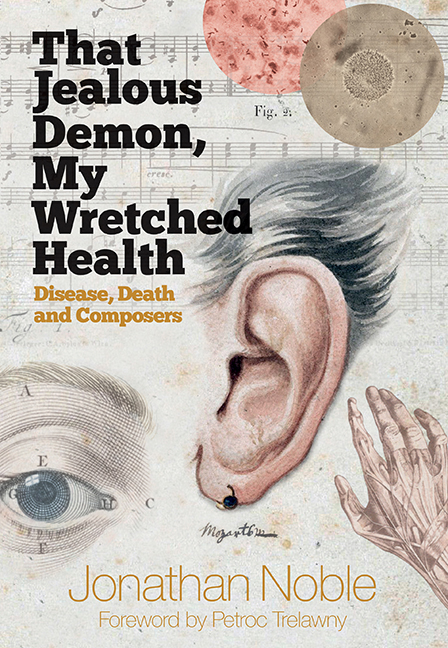Book contents
- Frontmatter
- Dedication
- Contents
- List of Illustrations
- Foreword
- Acknowledgements
- Medical Glossary
- Introduction
- 1 The Frailty of Youth
- 2 A Triumphant Old Age
- 3 Iatrogenic Afflictions
- 4 Syphilis
- 5 Alcoholism
- 6 Troubled Minds: Mental Illness and Suicide
- 7 Nerves Beyond the Edge: Other Afflictions of the Nervous System
- 8 Broken Hearts
- 9 Breathless: Respiratory Diseases
- 10 Cancer
- 11 The Ultimate Blow: Deafness
- Epilogue and Coda
- Appendix: Accidental and/or Violent Deaths
- References
- Bibliography
- Index
Foreword
Published online by Cambridge University Press: 05 September 2018
- Frontmatter
- Dedication
- Contents
- List of Illustrations
- Foreword
- Acknowledgements
- Medical Glossary
- Introduction
- 1 The Frailty of Youth
- 2 A Triumphant Old Age
- 3 Iatrogenic Afflictions
- 4 Syphilis
- 5 Alcoholism
- 6 Troubled Minds: Mental Illness and Suicide
- 7 Nerves Beyond the Edge: Other Afflictions of the Nervous System
- 8 Broken Hearts
- 9 Breathless: Respiratory Diseases
- 10 Cancer
- 11 The Ultimate Blow: Deafness
- Epilogue and Coda
- Appendix: Accidental and/or Violent Deaths
- References
- Bibliography
- Index
Summary
In my early days at Radio 3 I well remember a veteran producer throwing back a script I'd written for a concert broadcast. ‘There's no colour’, he proclaimed. ‘Bring the composer to life’. It's advice I have never forgotten. Talking about sonata form or key structure is no use to anyone who hasn't studied music theory. But talk about lovers, travels, debts, and above all, health, and a long dead composer can come to life again.
Beethoven's deafness, Schubert's syphilis, and Elgar's acute hypochondria have become part of the shorthand of their lives – even if, as Jonathan Noble reveals, the relevance of each condition to the composer's existence has been rather exaggerated. Until the last century few composers enjoyed serious academic study during their lifetimes; biographies tended to be either self-serving hagiography, the brutally destructive work of an enemy, or a heavily embellished account based on scant information. Few writers would have consulted medical records; loose, generalised descriptions of health conditions quickly became accepted facts. Peter Shaffer's play ‘Amadeus’ is a masterpiece, but did Mozart really suffer so acutely from Tourette's syndrome? If Sibelius actually was a chronic alcoholic would he have lived to celebrate his 90th birthday?
The number of surgeons and doctors found in amateur orchestras, string quartets and choral societies is raw proof of a close connection between medicine and music. The author, a renowned orthopaedic surgeon, has treated his subject matter as he would a patient coming for a consultation, considering all the information available to him. His treatment of seventy composers provides a series of fascinating and revealing stories. This opportunity to consider their health as a matter of fact, rather than ‘colour’ burnished by time will surely help us appreciate their lives more, and understand their music better.
- Type
- Chapter
- Information
- That Jealous Demon, My Wretched HealthDisease, Death and Composers, pp. xiiPublisher: Boydell & BrewerPrint publication year: 2018



